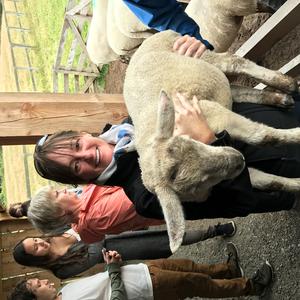Trish Patrick
Dr. Patricia Patrick
Dr. Patrick’s formal training is in curriculum and instruction. Her specialty is science education (certified grades 7-12) and informal science education (learning outside the classroom). She graduated with her PhD in 2006. Her teaching experience at the university level includes working with elementary, middle level, and secondary science teacher candidates. Currently, Dr. Patrick is in a higher education position related to science teacher education and qualitative research design and assessment at both online and brick and mortar schools. Her specialties are the application of learning theory, qualitative research design, and science learning. At Walden University, she is a committee chair and member in the doctoral capstone project study courses. Dr. Patrick has chaired and served on numerous doctoral student dissertation committees.
Dr. Patrick’s research interests focus on learning science outside the classroom. She is especially interested in how children learn science at home and with their family. She is a Fulbright Scholar. She completed her research in Indonesia, where she studied the dukun (native healers), turtle programs designed for elementary, middle level, and secondary students, and the research and mentoring relationships for undergraduate students. She has presented at numerous national and international conferences including the National Association for Research in Science Teaching, National Science Teachers Association, European Science Education Research Association, International Zoo Educators Association, British Educational Research Association. She has published over 30 peer-reviewed articles as well as 2 books on learning in museums and informal teacher education. She has been a guest lecturer in 5 countries.
Education
BS, University of North Carolina at Wilmington
MEd, University of North Carolina at Greensboro
PhD, University of North Carolina at Greensboro
Awards / Honors
Phi Beta Delta Honor Society, Bennett College, 2010
Publications
Patrick, P. (2017). Can I Get Directions to My Kidneys Please?.
Blatt, E., Patrick, P. (2014). An Exploration of Pre-Service Teachers' Experiences in Outdoor ‘Places’ and Intentions for Teaching in the Outdoors. International Journal of Science Education
Patrick, P., Matthews, C., Ayers, D., Tunnicliffe, S. (2007). Conservation and education: Prominent themes in zoo mission statements. Journal of Environmental Education
Patrick, P., Matteson, S. (2018). Elementary and middle level biology topics: a content analysis of Science and Children and Science Scope from 1990 to 2014. Journal of Biological Education
Patrick, P. (2016). Evolution and biodiversity: The bridge between zoos and classrooms. Newsletter conservation education committee: Talking about controversial issues
Jose, S., Patrick, P., Moseley, C. (2017). Experiential learning theory: the importance of outdoor classrooms in environmental education. International Journal of Science Education, Part B
Uzick, R., Patrick, P. (2018). Family discourse on an arboretum nature trail: explorers, protectors, rememberers, and sticky features. International Journal of Science Education, Part B
Patrick, P., Caplow, S. (2018). Identifying the foci of mission statements of the zoo and aquarium community. Museum Management and Curatorship
Patrick, P. (2017). Informal Science Educators and the Nine Dimensions of Reflective Practice.
Zhang, Y., Patrick, P. (2013). Introducing questioning techniques to pre- service teachers. Journal of Teacher Education and Educators
Patrick, P. (2017). Introduction.
Matteson, S. M., Ganesh, B. S., Coward, F. L., Patrick, P. (2012). Middle-level preservice mathematics teachers' mental representations of classroom floor plans. Teaching Education
Patrick, P., Tunnicliffe, S. (2010). Science teachers' drawings of what is inside the human body. Journal of Biological Education
Presentations
Patrick, P., Moorman, A. (2017). Actor-network theory: Boundary objects and the mobilization of family groups. European Science Education Research Association (ESERA)




